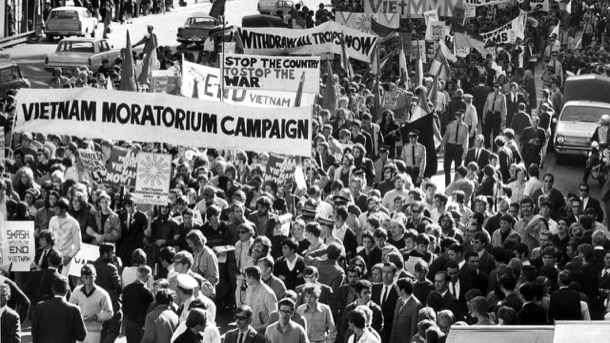The Croydon Years
When the Coates family moved to Croydon it was the beginning of the Great Depression and many men were out of work. To complicate matters, Alf had been in partnership in a hardware business in Bacchus Marsh that had burnt down. Not only was the fire a personally traumatic experience for the family, as their house had also burnt down, but the business was not insured. As manager, Alf was responsible for the lack of insurance. He was therefore "lucky indeed" to have the job as the hardware store manager at the Croydon Timber Yard. He was on a reduced salary as recompense for the losses of the other Bacchus Marsh partners, who now owned the Croydon business.
Croydon was at that time a pretty country town, connected to the world by the railway that ran, as it does now, from Flinders Street to Lilydale.
White settlement had reached Croydon in the 1850’s, as timber cutters arrived seeking new sources of timber for the needs of rapidly expanding Melbourne. Many small, and a few large land holdings were taken up, and fruit trees were found to flourish in the area.
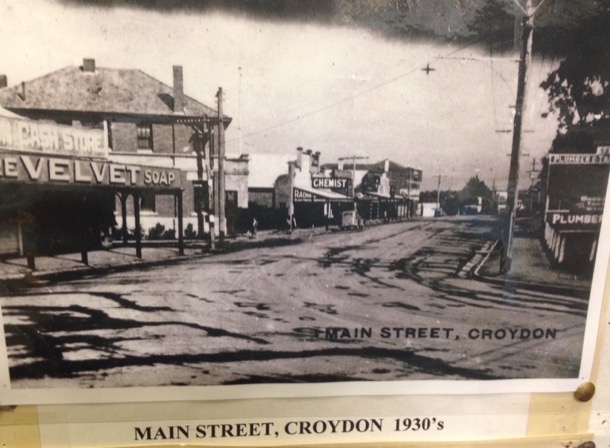
The town that the Coates family found, spread out from the railway station. Businesses and shops were strung out along the long, wide, slightly curving main street. The Dandenong Ranges made a lovely backdrop to the town that was surrounded by small farms, orchards and bushland. Home for the Coates was a small house, painted battleship grey, in Hewish Road, very near the corner of Main Street. This was the wrong side of the tracks. The expensive houses were built over the railway line in Wicklow Avenue, extending up the hill towards what is now Maroondah Highway.
They remember their house as having a beautiful backyard, graced by an enormous Mulberry tree and a large vegetable garden. There was a cow paddock on one side of the house and the Wine Hall on the other. Hewish Road at that time was unmade, covered in hard stone embedded in the clay. The Coates were right in the business end of town: Cook’s Grain Store was directly opposite and Croydon Timber Yard, not far away, also in Hewish Road. Not only did this fiercely teetotal family live next to the Wine Hall located on Main Street corner, but on the other corner was the Croydon Hotel. These two establishments loom large in their childhood memories, as they were the source of the moaning drunken men that they sometimes heard outside. Occasionally their father had to take the men home.
Croydon Hotel:
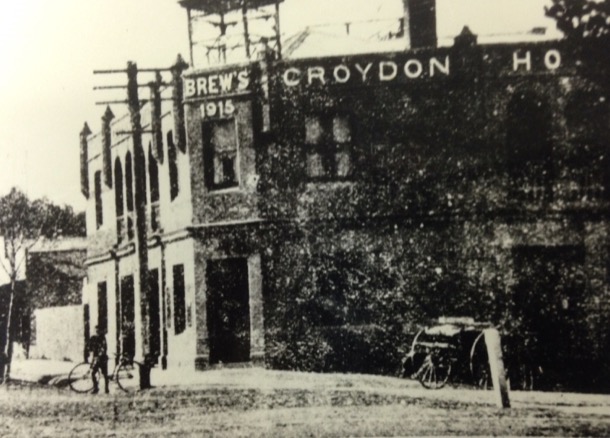
Croydon Wine Hall:
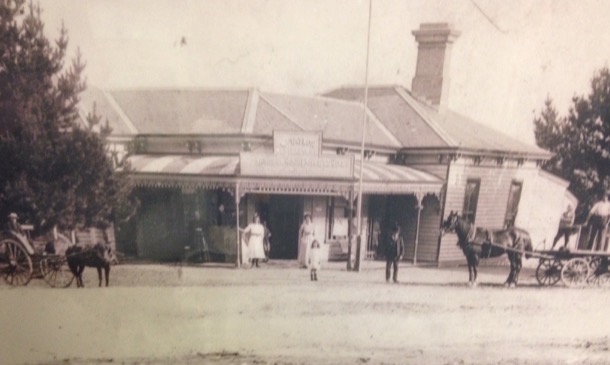
Alf worked weekdays, Friday nights and Saturday mornings at the timber yard. Once a month he also drove the truck to the wharves to collect timber.
Money was tight, especially as Alf and Alfreda wanted their girls to have a decent secondary education at MacRobertson Girls' High School in Albert Park. One-third of Alf’s wage went on rent and by the time bills were paid and weekly expenses were covered, there was not much left over. At secondary school, fees were charged, books and uniforms would need to be purchased and weekly train fares paid for. Daily life therefore included the care of livestock and the processing of milk and eggs: all quite time consuming.
As well as their home grown vegetables and fresh eggs, the Coates family produced their own milk and cream.
All was not hard work however, and the Coates’ kitchen, warmed by the one-fire stove, was the venue for cups of tea and chats, many of them about cricket. In the picture, Alf is second from the top left:
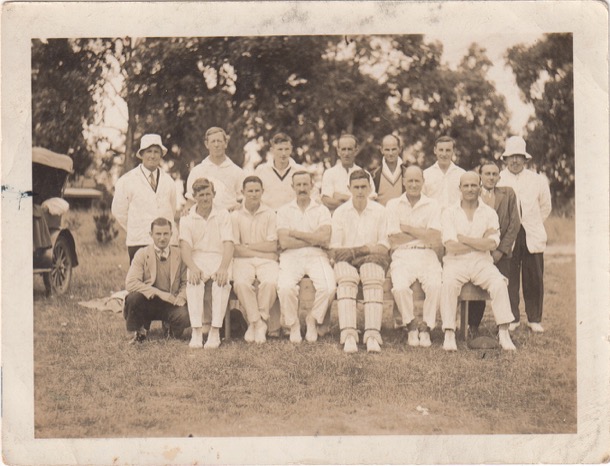
Marge and Alice had a very happy childhood in Croydon. They played often with the Cook sisters, Yvonne and Margaret, who lived opposite. The Cooks had once owned the Croydon Timber Company, Alf’s employer.
Their house was on the other side of Hewish Road, next to the hotel. Connected to the Cook’s house was the grain store, which was now the core of Mr Cook’s business. There were delivery horses in a nearby stable too, and cows in the paddocks behind. The grain store was packed with bags of chaff and grain. The girls spent many hours playing in there, climbing right up to the roof.
One happy memory is of “penny concerts”. Hours of preparation: planning, costume making, and rehearsing, culminated in a concert performed on the Cook’s wide side verandah. This seemed to be mostly in the summer holidays, when the Cook girls’ cousins came to stay. Marge and Alice sang part songs, often Elizabethan madrigals they had learnt at school: Alice singing soprano and Marge, alto. The adult audience (probably only their parents) paid a penny to attend.
Alice remembered playing a sort of scavenger hunt, following written clues to find a prize. “Next clue under the camellia bush”.
She also remembered marbles, played in the dirt on the side of the unmade Hewish Road. When Sue and I stood on the same spot in our Croydon visit, we could hardly cross Hewish Road, for traffic! In the 1930s, it was a quiet gravel road with no gutters and unmade footpaths.
The Coates and Cooks lived opposite each other, and used to signal out of windows at night across Hewish Road. They planned, but never carried out, midnight feasts.
The wild games and excitement of playing with the Cook contrasted with the much more demure and restrained Hebbard girls. Pam and Honor Hebbard were the daughters of Frank Hebbard, the Primary School Principal, and friend of Alf and Freda. Their huge library of books were available for Marge and Alice to borrow, and the garden was a delight to play in. The Hebbards lived up on the Hill, at the top of Kent Avenue, which wound up to what is now the Maroondah Highway, through foothills bushland. A favourite activity with the Hebbards was to wander this bushland looking for native orchids. The remnants of this forest are much prized today, though much of it is degraded, and many of the species of orchid are now only to be seem in a museum.
Visits to the beach, during Marge and Alice’s Croydon years, were limited to School and Sunday School picnics. But they did learn to swim. They would go by train to Lilydale, where there was a huge concrete tank, right on the side of the Olinda Creek. Fresh water would flow in and out with this quite large perennial creek. Alice remembered Mr Hebbard lining them all up along the side and getting them to enter the water with a shallow dive. Nowadays the pool has become a more modern outdoor pool, but it’s still in much the same place.
Friday night shopping was another form of fun. Marge recalled it as a chance for everyone to parade up and down the street. Alice remembered buying “sixpennorth” of lollies and sharing them out. It was a simple life for these country kids. It is notable that, three years apart in age, much of their leisure time was spent playing together.
Marge and Alice of course went to Primary School during these years at Croydon, Marge as far as Grade 8. We will spend more time on this important topic at a later date. Suffice to say, at the moment, that their parents’ friend, Frank Hebbard was the Principal, and he ran a very enlightened, rich educational program, in which the girls flourished. The Croydon Primary School has new premises these days, but the old buildings are still there, now occupied by a Community School.
Family entertainment included hikes from Croydon to Kalorama, and visits to friends, the Cheongs. They were a wealthy and prominent family in the area. At our visit to the museum in Croydon we found many mentions of them, in particular their importance to conservation of remnant foothills vegetation. Even now Cheong Wildflower Reserve, near Croydon, still fulfils that role.
Mr Cheong, from our mother's photo collection:
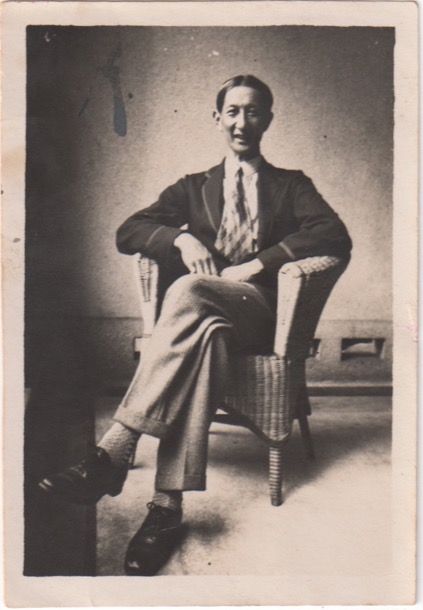
In their leisure time, many happy hours were spent in the Coates’ warm kitchen, “yarning’.
Even though much of the good food the Coates family ate was home grown, some things had to be purchased at the Main Street shops.
The Croydon years were remembered very fondly by both Marge and Alice. They were formative years for both of them. Alice actually names the four areas of interest from those years that became her life long passions.
In 1936 the Croydon years came to an end with the death of Martha Holm, Alfreda’s mother. Presumably the family had to move back to Boronia Street, Surrey Hills to help Alfreda's sister, Berta take care of Roger Holm, now quite an elderly man. Berta was working full time at her dressmaking business. Alf found a new job in the city and Alice embarked on her secondary schooling at MacRobertson Girls’ High School.
The Demon Drink
It was clearly uncommon for anyone in our narrow anglo world to drink at home. Here, for instance, is an extract from a Primary school resource book on Temperance from the 1950s.
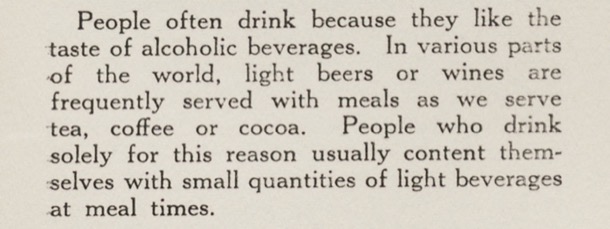
The international Temperance movement was one of the most powerful social movements of the 19th and early 20th centuries. Its advocates regarded alcohol as a social evil and sought to have it banned entirely, or at least its consumption drastically reduced.
Initially it was just a move against drinking spirits and “hard liquor". But during Victorian times it became more a push for total abstinence and became more specifically a women’s movement, connected with Protestant Christianity. Groups of women activists were to be found right across the western world.
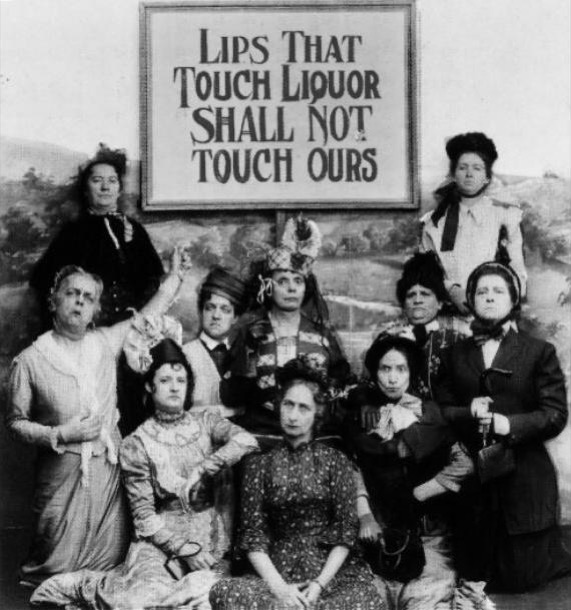
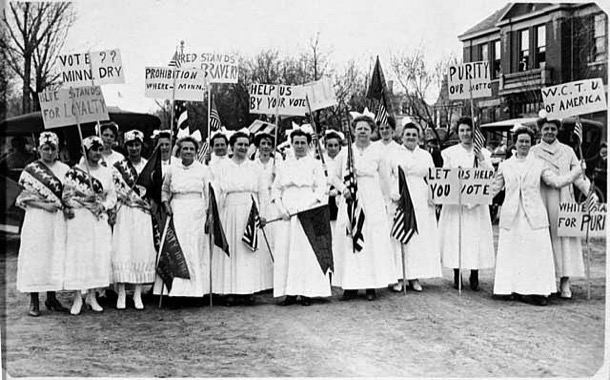
The Temperance movement had its most obvious success in America, where the sale of alcohol became illegal across the whole country overnight in 1920.
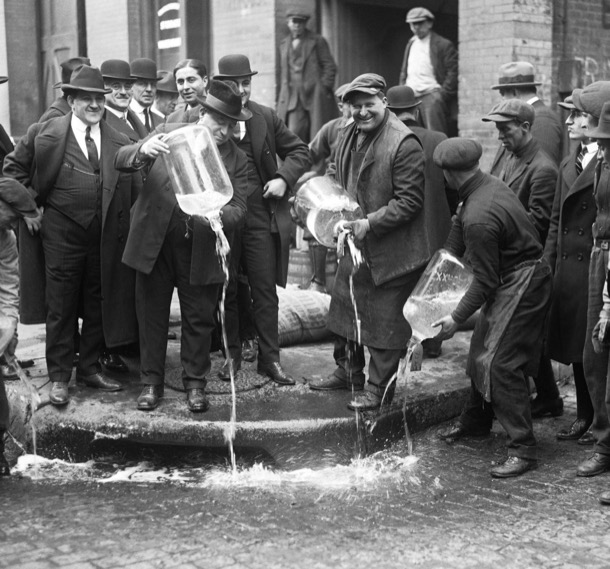
This period of American history has become known as ‘Prohibition”, the Roaring Twenties. It conjures up images of gangsters, speak easies and moonshine. The law did not have the support of much of the population. But it wasn’t until 1933 that it was finally repealed.
In Australia the temperance movement did not succeed in having the ‘demon drink’ banned but it did lobby vigorously for restriction of hotel opening hours. By 1923, hotel opening hours were restricted in all states. The closing of hotels at 6.00 PM led to a phenomenon known as the ‘Six O’clock Swill’.
It is hard to believe looking back that the daily rush to the bar was part of everyday life. Rather than limit drunkenness it actually encouraged it, as men who ‘knocked off’ work at 5 o’clock had only on hour in which to drink. Hotels were set up to serve as many beers as were demanded in this hour. Pubs were overcrowded, as men five or six deep lined the bar waiting to be served and patrons spilled out into the streets.
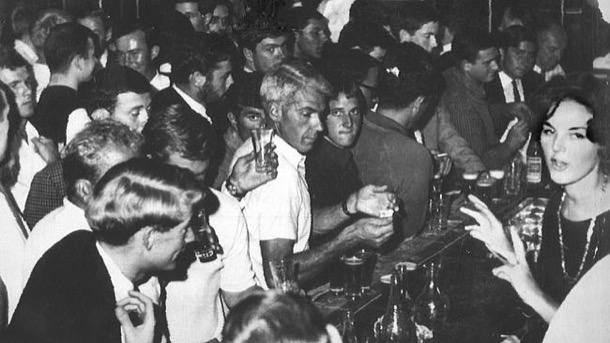
Pubs did smell strongly of beer as so much was served in such a short time. Sue can remember walking past Young and Jacksons on her way home and pushing her way through the throng of men, spilling out onto the pavement on the corner of Flinders Street and Swanston Street. Men, yes only men! Women were not permitted in the Bar until the early 1960s and for many years after that it was frowned upon. We can remember conversation stopping momentarily when we first walked into a bar, particularly in the country.
The Demon Drink indeed! We come from a long line of teetotallers: our great grandfather Reverent Alfred Coates, our great aunt Sister Bessie, our maternal grandparents, Alfred and Alfreda, their siblings and our parents. Our mother’s family, the Coates, being staunchly Methodist, we imagine would have been very sympathetic to the temperance agenda. Here is Alfred, in his Methodist pastor uniform with Emma and their daughter:
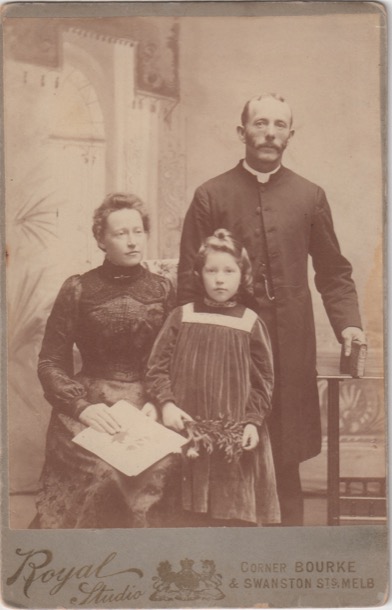
We were very aware as children that none of our family touched alcohol and that it was particularly frowned on by our rather upright Grandfather.
We too, at the tender age of eleven of twelve, have had our brush with The Independent Order of Rechabites, who provide educational material for Victorian Schools.
Alice and Marge as old ladies recounted their childhood memories of drunkenness, in the country town of Croydon during the 1930s, with obvious disapproval and distaste. Here they discuss the public drunkenness they witnessed at the hotel and wine hall near their house:
I remember our aunt having a glass of beer at the dinner table, when we were staying there as children. I commented on it and I remember being rebuked. Later our mother told me that it was medicinal, that she had found that drinking beer with food helped her digestion. That mum had felt the need to explain it that way, and that our aunt had reacted so strongly to a child’s interest is understandable in the light of heir own childhood experiences and family attitudes.
And then, during our late teens, as the 1960s became the 1970s, this part of our past just melted away. It became normal and natural too open a bottle of wine to share. There was binge drinking around us, especially at Uni parties, and the drink driving hazard was evident, but the moral dimension, the “holier than thou” attitudes, the raised eyebrow were all gone. Society had grown up about the same time that we did.
.
How to Rescue the World
ALF AND ALFREDA
Marge and Alice in their family history tapes, discuss Alfreda’s political and philosophical bent. The setting is Croydon in the 1930s. Croydon is a country town and it is the height of The Great Depression. Alf is working long hours at the Croydon Timber Yard and the family sell milk and cream from their cow. Many of their neighbours are unemployed, and homeless men come to their door to ask for work or food. In Germany, Hitler’s Nazi party is beginning to show its true colours and Russia has been a republic for less than twenty years. Alfreda is consumed by the great ideas of Politics and Economics. She shares this with Frank Hibbert, the Croydon Primary School headmaster.
Alfreda’s friend, Frank Hibbert was a progressive educator who shared her political views. His influence on the young Marge and Alice was profound.
There are also signs of early environmentalism in Alfreda’s letters. On January 16th 1935, she and Alf are camping at Yellingbo, by the creek in what is now the protected area for the Helmeted Honeyeater. She writes to Alice:
Yesterday was a beautiful day and in the evening just after sunset - oh! I wish i could tell you or show you how beautiful the bush was - for half an hour. What God has given us is so beautiful, but don’t humans muck things up - an ugly fence, a cigarette butt, an old piece of lolly paper thrown down. an old pair of shoes - everything we touch seems ugly after that beauty that I saw last night- even our bodies haven’t the beauty and grace of the wild things….. I’ll see we don’t disfigure God’s beautiful bush when we leave this lovely spot.
And later, in 1946, Alf gives us a taste of his own strong sense of social justice. He is visiting Marge in Sydney and has just received the news that Alice and Jim have managed to buy the block of land in Box Hill South that became our family home. He writes:
Your news about your block of land caused quite a lot of excitement in the family circle. Our own few square feet of land is of great importance in our lives. At last we are the possessors of what really amounts to an inheritance - a small portion of God’s earth which we can call our own. It was ordained that each man should have his share of good earth; but man overruled God’s laws and made his own, thereby making it easy enough for a rich man to obtain all the land he wants to, but placing every obstruction in the path of the poor man to obtain that which is morally his own. It is only when people, like you two, scrape to save the wherewithal, that you get your share, or rather, a very small portion of it. But I must keep off my pet theme.
ALICE AND JIM
This was the value system that Alice, our mother, has passed on to us. We were never in any doubt about which side of any particular issue was the correct one.
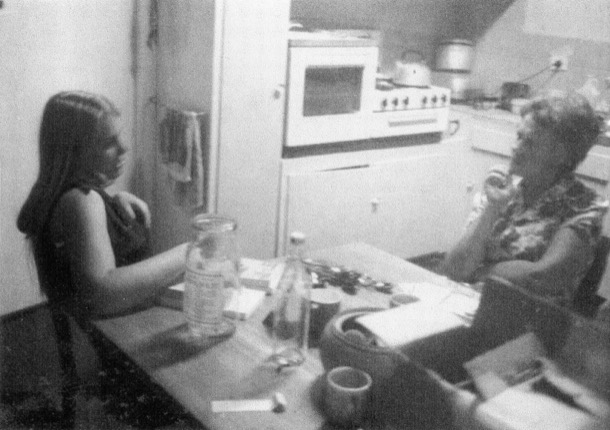
Margaret and Alice at the Moore Street kitchen table
Both Alice and Jim, our father, were staunch Labour voters, and had a strong commitment to social justice.
The world’s first atomic bomb was detonated in Japan in 1945, followed by a nuclear arms race between the USA and the USSR. Bombs were tested, and people felt that there was a constant threat of war breaking out again. Alice and Jim and a like-minded couple from our street were involved in the call for unilateral nuclear disarmament. Another neighbour, Judah Watten, a writer and a communist, was also a member of this “leftist” protest group. This was the time of anti communist McCarthyism in America, and Jim and Alice’s actions were quite radical.
Alice became more confident and able to hold her own in conversations over these years. There were many discussions around our Moore Street kitchen table about the social or political issue of the moment.
Christian social justice became her main focus during her fifties and sixties.
She was active in a number of left wing church organisations. I remember in 1975, when I was living in the country, listening to her talk on the radio about third world poverty. Even in her later years, blind and housebound, she would listen avidly to the radio and talk about politics to anyone who would listen.
Of Jim, we have fewer memories. We remember marching with him in a teachers' protest on the issue of State Aid to private schools. We are now quite used to Governments providing money to private schools, but, when first mooted by the Menzies Government, it was greeted with outrage by many. One of Jim’s concerns during the march was that he would appear on the television news and be seen by his conservative, Catholic, Liberal voting mother.
Jim was a member of the Board of Management of our family’s church, St James, Wattle Park. He was outraged when he discovered the cost of the new church building. He resigned over the issue. In his view the money would have been better spent elsewhere. This is evidence of the strength of his principles, as his role in the church was important to him.
SUE
My memories of my early twenties and engagement in ‘protest’ is of the outrage of youth. ‘How dare they!’
During my last year at College and my first years of teaching, the VSTA, the union representing secondary teachers, was very active in a campaign to improve teaching conditions. I had had an early introduction to strike action by teachers when Margaret and I marched with Dad over state aid to non government schools so I was an eager participant in the ferment.
In outrage that the State Government would contemplate increasing class sizes and teaching allotments, a couple of friends and I formed a VSTA branch and began conducting meetings. I remember calling a strike meeting and organising a boycott of classes that we were convinced would change the world. It didn't! Fancy that! We were still fighting this battle during our first years of teaching.
A much more serious concern was the Vietnam War that the US had been involved in for years and, unbeknown to the public, so had Australia! Prime Minister Menzies had mislead the Parliament and the public, and had committed Special Forces to fight in Vietnam. His successor, Harold Holt, invoking the ANZUS Treaty, upped our level of support and, as the war dragged on with no victory in sight, National Service or conscription was introduced. My family and friends were all very much against the war and the deceptive and high handed action by successive Liberal Governments. Outrage and protest was a consuming passion.
It was sometimes a bit scary! In the early days before the huge moratoriums, the numbers protesting were considerable but not large, and the police seemed to be a threatening and sinister presence. I remember the July 4th 1967 protest outside the American Consulate in St Kilda Road. I went to this one with Mum and Margaret.
It was dark as we arrived and stood with the other protesters outside the closed front gates to the Consulate. There was no visible presence in the building, as we held our anti-war banners and chanted slogans. The most sinister aspect was watching the police buses pull up across the park and disgorge many, many policemen. I remember thinking, ‘Can this be Australia?’ A noisy and highly visible minority of the protesters were quite confrontational and aggressive and were consequently arrested. We stayed well clear of the action but it was hard to avoid the police horses. They are enormous up front and personal, and were used very effectively to nudge the crowd away from the gates. Overall it was a very sobering experience and one that has stayed with me. We live in a democracy with the right to protest peacefully. What must it be like protesting under less benign circumstances?
After these small beginnings the protest numbers swelled, culminating in the euphoria of the Moratorium Marches that brought cities across the world to a standstill, including Melbourne.
The ABC captures the spirit and the times better than I can. Have a look:
http://www.abc.net.au/archives/80days/stories/2012/01/19/3411534.htm
Even though I may have wished for many thousands to take to the streets again, as they did in the Moratoriums, it has not happened on such a scale, but here’s hoping!!
The demonstrations against the Vietnam War left a profound legacy. After such a powerful and successful protest movement, it seems the natural response to feelings of outrage: paint a banner and march! As Margaret says, ‘It is part of democracy’. Aren't we lucky!
Therefore, along with thousands of other concerned people, I have attempted to ban nuclear weapons, stop the war in Iraq, stop logging of old growth forests in Tasmania and East Gippsland and persuade our government to take action to reduce emissions.
The world has changed, but not always for the better. Today, as well as the kitchen table, the letter, the banner and the march, we have at our disposal the power of global and instant communication and social media. It is the era of Get Up and ’Clicktivism’.
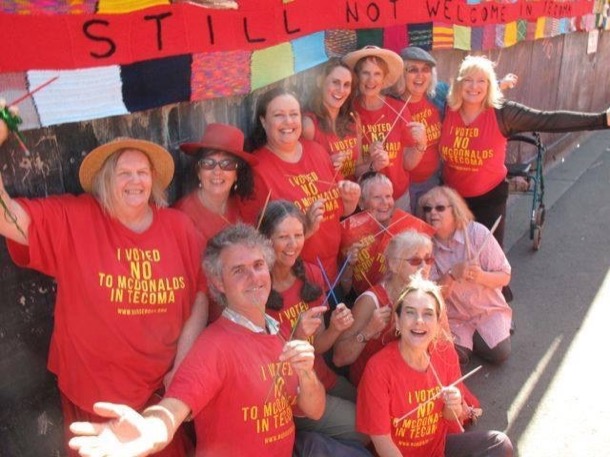
Sue and Margaret protesting together at Tecoma
MARGARET
July 4th 1967. It is winter in Melbourne and it is raining. The puddles flash …blue…black…blue…black…
“Link arms!” call the young bearded marshalls running up and down the line of marchers. We are marching on the American Embassy, protesting atrocities in Vietnam, pressurising our government to change their “All the way with LBJ” policy. Police horses charge the crowd. One of my companions, my forty-three year old mother, loses her handbag.
Five years later, a New Yorker I go out with a few times, assures me that there would have been fully armed Marines in the embassy, and that they wouldn’t have hesitated to shoot, had we successfully “stormed” the building.
This was my first real “demo”. I don’t remember why it was just my sister, my mother and I there. I was fifteen.
Over the ensuing fifty years, I have waved banners demanding many things: the end to the logging of old growth forests and the creation of National parks; that uranium be left in the ground; that there be land rights for our indigenous populations; smaller class sizes; a fairer allocation of education funds and more of them; that we not go to war and/or bring our troops home; that the public service not be decimated by cuts; that the separation of power between the judiciary, the legislature and the executive be maintained; that MacDonald’s stay out of our Hills community.
Most recently I marched with Michael and Chris to urge our planet to act on Climate Change:
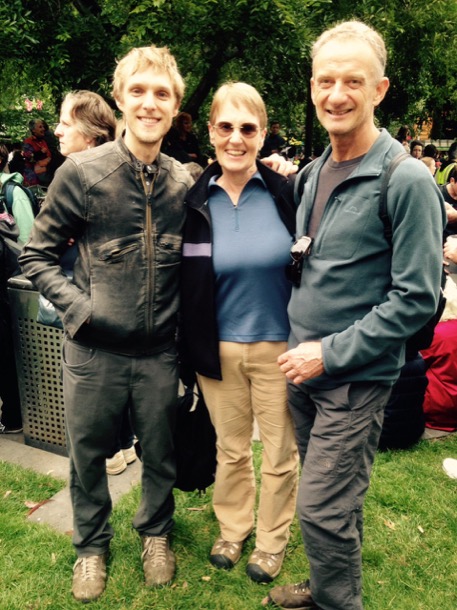
Marching for climate justice... a family affair
The thread that links these causes, is the same thread that runs back to the 1930s around the Coates’ dinner table in Croydon. It involves words like environment, justice, democracy, fairness, equity, peace, kindness and conservation.
Twelfth Birthday Letters to Alice
These two letters were written to our mother Alice on her 12th birthday. Alice was staying with her grandparents , Roger and Martha Holm at their house in Boronia Street Surrey Hills. By the way, the house is still there, but more of that later in another story. Living with Roger and Martha was another of their daughters, Bertha or Auntie Bert, unmarried and with a flourishing dressmaking business in the front room of the house. Later she moved the business to Camberwell at the Junction. These letters were written by Alice's father Alfred, usually known as Alf, and her mother Alfreda or Freda. The letters reveal two very different personalities that both had a powerful and enduring influence on their young daughter. Our joint memories of the two authors of the letters are of two very different individuals.
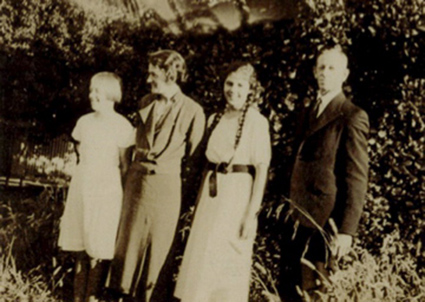
From left Alice, Freda, Marge, Alf
ALF'S LETTER
CROYDON
23.9.35
My Dear Baby,
Although you will be 12 years old tomorrow you are still my baby, and you always will be. Your old Pop wishes you many happy returns of the day, and hopes that the sun will be shining brightly, so that you will be able to enjoy yourself.
I am sitting beside the stove writing this, although the night is not cold; but you know how I love the fire. (Mummy has just burst in on my meditations with a dose of Cascara.) (herbal laxative)
The Kettle sings upon the stove,
It sings a lovely song to me.
It sings a song I dearly love-
“I’m boiling for your cup of tea”
(Auntie will appreciate that verse)
The chooks have settled down to rest
Their daily duty nobly done.
Each one has given of her best,
And Mummy loves them, every one.
(That verse will appeal to Nanna)
The cats are sleeping in the straw,
Their stomachs full of meat and mice.
They sleep so sound - I heard them snore.
Their beds are comfy, soft, and nice.
The house is quiet. All noise is stilled.
Outside the night is calm and clear.
My cup of love has now been filled.
I drink your health, my Baby dear.
(A. J. Coates Poet)
Don’t stay away too long. I can’t spare you. I haven’t any anybody to get in the gun. The cow got out of the paddock, and I told her she was in the gun; but she didn’t take any notice of me. So what’s the good of that.
Good-night, Snowy-Bob, with your
Dad’s best love.
X x x x x x x x
Give my love to everybody.
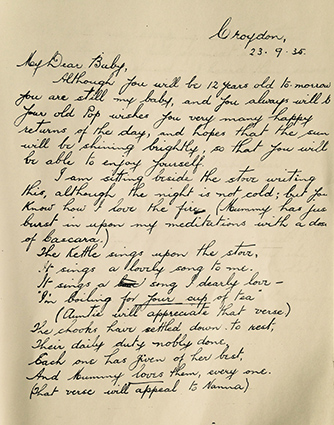
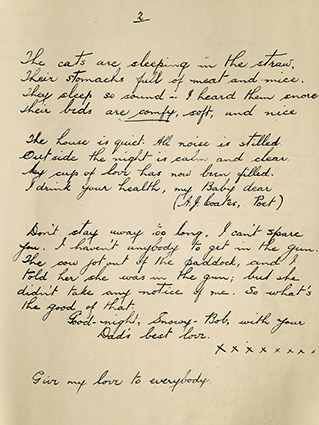
ALFREDA'S LETTER
CROYDON
23.9.35
My dear little Girl,
I cannot find a pen but I must write and wish you many happy returns of your birthday even if I only use pencil. It is rather superfluous for mothers to wish their children that formal wish, isn’t it dear? Because every day we are doing things to make our little children well and happy so that they will have many happy returns.
When you are away from me I realize how much every minute of the day is spent in doing this and how much I love my little baby girl. My mother and father did that for me and some day you will do that for your little children and then you will realise what a big love mothers and fathers have for their children It is the love that makes life worth living - the giving love, or shall I call it: the love that forgets self. That is the kind of love that makes the giver happiest.
It is one of the big true things that Jesus taught. I think the best I can wish for you on your 12th birthday is that you will realize more and more as the years go on just how true and real are all the things that Jesus taught, and dear you can only get to know by letting God teach you, asking Him to teach you.
What a funny old letter to be writing to you today dear.
I wonder if it is because I realize you are growing up. You will be finding things out yourself more, in other words “growing up”. I think you started growing when you were a baby but I don’t just mean that kind of growing up.
Well dear we have had quite a gay weekend, the pictures were beautiful. I was wishing you and Marj were there. Tell Auntie to ring Dad if she has any other plans for Wednesday.
Good-bye my dear little one.
All my love is going to be sent to you at 12 o’clock tomorrow by thought waves.
Do you know what I mean? I will think of you at 12 o’clock and you think of me and that that will mean a birthday kiss and all my love.
Mother
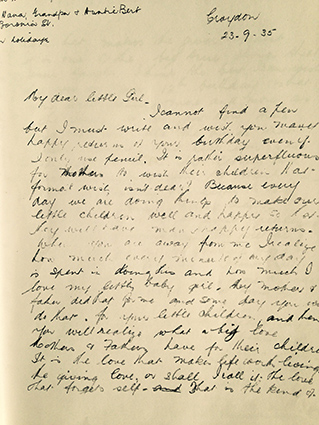
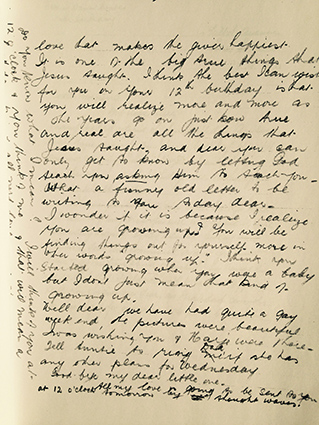
Here are Martha and Roger with Alice and Marge and other younger grandchildren in the Boronia Street Garden
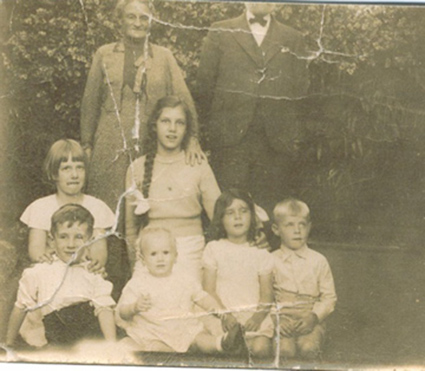
Memories of Alf
“A J Coates, poet.” That dry humour is so much as I remember my papa. My strongest memories of him are from his time living in the flat attached to our house in the nineteen sixties. By that time his red hair was greying and although he was still tall, he was a bit stooped.
“What do an old spud and a man watching a football match have in common? They’re both “specked taters”. His jokes were all like that.
But his sense of humour was strangely coupled with an enduring air of melancholy. He had several “nervous breakdowns” in his life. Nowadays these would be called bouts of clinical depression.
Alf had been a very gifted student and had spent his very early working life as a teacher. The precision of his letter writing is evident in the setting out and punctuation.
We remember his collection of classics and poetry books and often he would lend them to us. He loved reading, including poetry. The “bush poets” Henry Lawson and Banjo Patterson’s best work was behind them by the time Alf was at school, but their work, and that of other Australian poets were very strongly part of the everyday curriculum. This gives a context to Alf writing a mock bush poem as he did in his letter, and signing it like that. But that wry, self deprecating humour is there too.
The other aspect of his personality that shines through is his gentle warmth. This was a time when Australian men were loathe to express such softness. Our mother told us about how he struggled with his own sense of masculinity. Although he worked in timber yards, his work was behind the hardware shop desk. He was ashamed of this. His insistence on only ever wearing black socks was seen as symbolic of his fear of being seen as a sissy. And yet here is this loving, expressive father writing to his daughter, apparently at ease with openly expressing his love.
Memories of Alfreda
Alfreda was also tall. I remember her as a rather elegant, formal figure, clad in beautifully tailored clothes, no doubt made for her by her clever sister. She had very long hair always worn in a loose bun. I do not remember her ever being without her stockings and high heeled lace-up black shoes. The two times I remember staying with Nana and Papa I can remember watching Nana in her dressing gown, sitting at her dressing table, brushing her hair and loosely plaiting it for the night. She was quite a remote figure, not one for hugs and cuddles. However, my memories are of warmth and affection towards her two daughters and her husband.
Neither Margaret or I have any memories of her obviously very strong religious beliefs, that seem to have been very much part of her everyday life and thoughts. We only learnt of these through reading her letters. It would be gratifying to Alfreda that her daughter Alice did indeed see “just how true are all the things that Jesus taught". In fact, in the latter part of her life, Alice’s interest in theology provided her with both intellectual stimulation and solace. I suspect mother and daughter were very alike.
How we remember Alf and Alfreda, in their seventies:
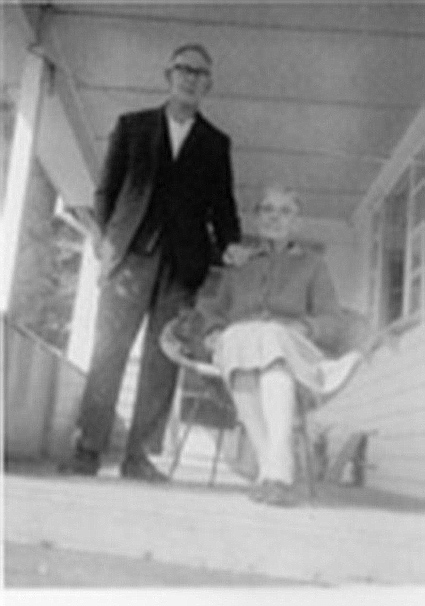
Historical, Social and Geographical context
Main Street Croydon, 1930s
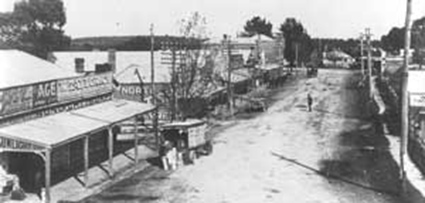
At the time of these letters, the Coates family lived in Hewish Road, Croydon, close to where the Croydon swimming pool is today. The Great Depression of the nineteen-thirties was at its height. Alf never lost his job at the Croydon Timber Yards, even though many men did. The family kept chickens, whose eggs they sold, and a cow and had a large vegetable garden.
Alice and Marge remembered the desperate men who would come to the house for a chance to do some odd jobs around the house. The Coates family were not well off by any means, but they were grateful for what they had and shared it generously with others.
Politically the nineteen-thirties was a time of turmoil and change. Thirty percent of the Australian workforce was unemployed, and this was reflected across the western world. Economic theories about how to deal with the crisis ranged from the Keynesian “spend your way out” adopted by America, to severe austerity and cuts in Government spending practised in Australia. Political “isms” and experimentations like Communism and Nazism were being explored and discussed around kitchen tables everywhere, and nowhere more ardently than at the Coates’. Alice remembered such pearls of wisdom from her mother as “you can’t educate for goodness and you can’t legislate for goodness”.
The young Alice drank in all this talk and even as a twelve year old, when these letters were written, she was developing the philosophies that would engage her for all of her life.
Croydon, a busy suburb nowadays, was a country town, connected by rail to the Eastern suburbs and the city. In 1935 Alice would have been going to Mont Albert Central School (until Year 8) and Marge to the city based Melbourne Girls' High School, soon to be renamed McRobertson Girls' High School. They travelled on the steam train that went as far as Healesville and Warburton. Incredibly this was the closest school for them that went past Year 10. Expensive school fees were a stretch for the family, but education was valued very highly.

